Vulnerable Population: CALD Cancer Experience in Australian Context
VerifiedAdded on 2022/09/14
|15
|3745
|9
Essay
AI Summary
This essay examines the cancer experience of Culturally and Linguistically Diverse (CALD) populations in Australia, identifying them as a vulnerable group due to cultural, linguistic, and socioeconomic barriers. It analyzes the challenges these individuals face in cancer screening, diagnosis, and treatment, including language barriers, cultural beliefs, and limited access to healthcare services. The essay emphasizes the crucial role of nurses in providing culturally safe and responsive care, highlighting the need for awareness of cultural values, effective communication, and patient-centered approaches. It discusses the importance of adapting treatment protocols, promoting health literacy, and involving family members in decision-making to improve patient outcomes. The essay also recommends changes to clinical practices, such as incorporating cultural assessment tools, providing interpreter services, and implementing culturally sensitive training for healthcare professionals to ensure equitable and effective cancer care for CALD communities.
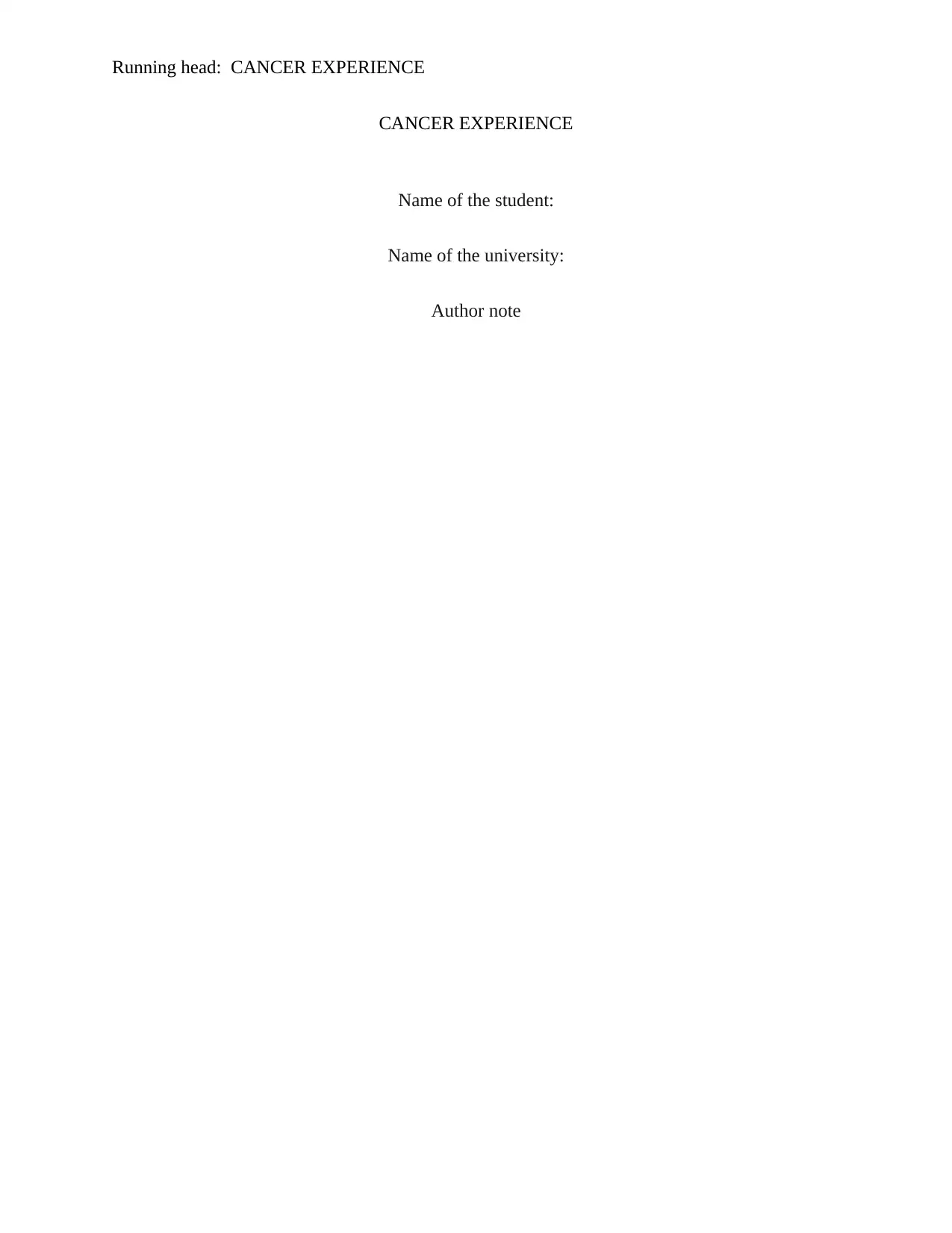
Running head: CANCER EXPERIENCE
CANCER EXPERIENCE
Name of the student:
Name of the university:
Author note
CANCER EXPERIENCE
Name of the student:
Name of the university:
Author note
Paraphrase This Document
Need a fresh take? Get an instant paraphrase of this document with our AI Paraphraser
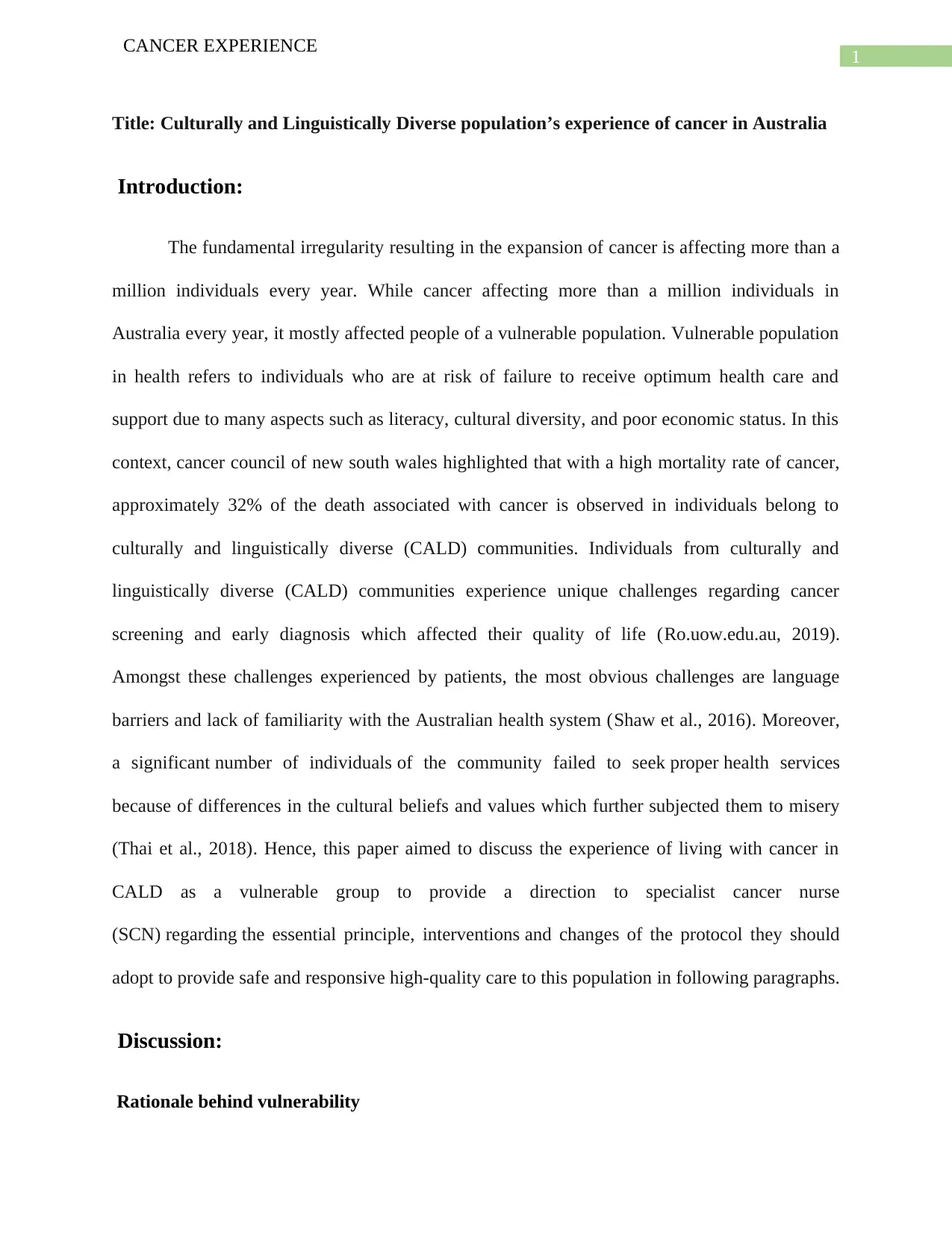
1
CANCER EXPERIENCE
Title: Culturally and Linguistically Diverse population’s experience of cancer in Australia
Introduction:
The fundamental irregularity resulting in the expansion of cancer is affecting more than a
million individuals every year. While cancer affecting more than a million individuals in
Australia every year, it mostly affected people of a vulnerable population. Vulnerable population
in health refers to individuals who are at risk of failure to receive optimum health care and
support due to many aspects such as literacy, cultural diversity, and poor economic status. In this
context, cancer council of new south wales highlighted that with a high mortality rate of cancer,
approximately 32% of the death associated with cancer is observed in individuals belong to
culturally and linguistically diverse (CALD) communities. Individuals from culturally and
linguistically diverse (CALD) communities experience unique challenges regarding cancer
screening and early diagnosis which affected their quality of life (Ro.uow.edu.au, 2019).
Amongst these challenges experienced by patients, the most obvious challenges are language
barriers and lack of familiarity with the Australian health system (Shaw et al., 2016). Moreover,
a significant number of individuals of the community failed to seek proper health services
because of differences in the cultural beliefs and values which further subjected them to misery
(Thai et al., 2018). Hence, this paper aimed to discuss the experience of living with cancer in
CALD as a vulnerable group to provide a direction to specialist cancer nurse
(SCN) regarding the essential principle, interventions and changes of the protocol they should
adopt to provide safe and responsive high-quality care to this population in following paragraphs.
Discussion:
Rationale behind vulnerability
CANCER EXPERIENCE
Title: Culturally and Linguistically Diverse population’s experience of cancer in Australia
Introduction:
The fundamental irregularity resulting in the expansion of cancer is affecting more than a
million individuals every year. While cancer affecting more than a million individuals in
Australia every year, it mostly affected people of a vulnerable population. Vulnerable population
in health refers to individuals who are at risk of failure to receive optimum health care and
support due to many aspects such as literacy, cultural diversity, and poor economic status. In this
context, cancer council of new south wales highlighted that with a high mortality rate of cancer,
approximately 32% of the death associated with cancer is observed in individuals belong to
culturally and linguistically diverse (CALD) communities. Individuals from culturally and
linguistically diverse (CALD) communities experience unique challenges regarding cancer
screening and early diagnosis which affected their quality of life (Ro.uow.edu.au, 2019).
Amongst these challenges experienced by patients, the most obvious challenges are language
barriers and lack of familiarity with the Australian health system (Shaw et al., 2016). Moreover,
a significant number of individuals of the community failed to seek proper health services
because of differences in the cultural beliefs and values which further subjected them to misery
(Thai et al., 2018). Hence, this paper aimed to discuss the experience of living with cancer in
CALD as a vulnerable group to provide a direction to specialist cancer nurse
(SCN) regarding the essential principle, interventions and changes of the protocol they should
adopt to provide safe and responsive high-quality care to this population in following paragraphs.
Discussion:
Rationale behind vulnerability
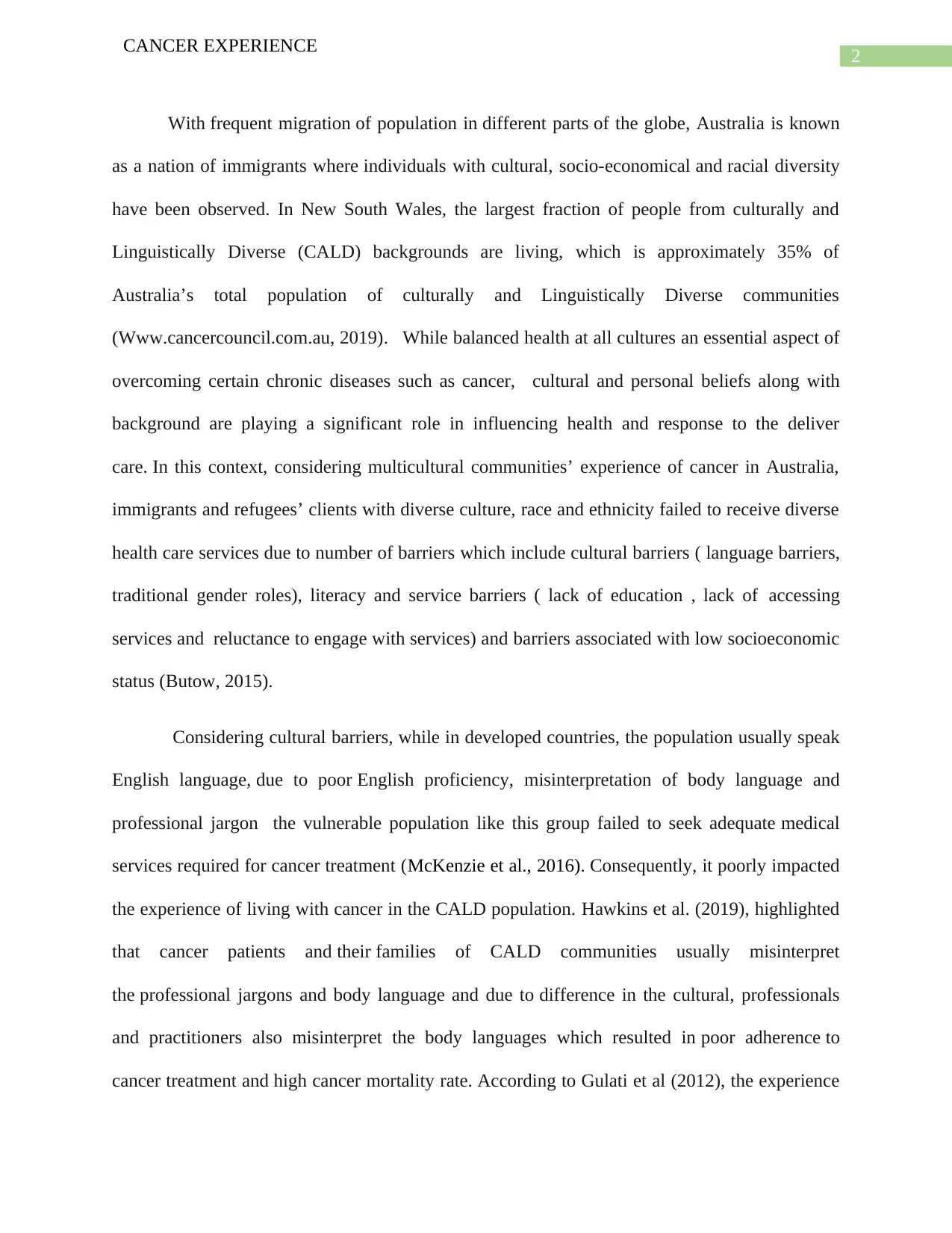
2
CANCER EXPERIENCE
With frequent migration of population in different parts of the globe, Australia is known
as a nation of immigrants where individuals with cultural, socio-economical and racial diversity
have been observed. In New South Wales, the largest fraction of people from culturally and
Linguistically Diverse (CALD) backgrounds are living, which is approximately 35% of
Australia’s total population of culturally and Linguistically Diverse communities
(Www.cancercouncil.com.au, 2019). While balanced health at all cultures an essential aspect of
overcoming certain chronic diseases such as cancer, cultural and personal beliefs along with
background are playing a significant role in influencing health and response to the deliver
care. In this context, considering multicultural communities’ experience of cancer in Australia,
immigrants and refugees’ clients with diverse culture, race and ethnicity failed to receive diverse
health care services due to number of barriers which include cultural barriers ( language barriers,
traditional gender roles), literacy and service barriers ( lack of education , lack of accessing
services and reluctance to engage with services) and barriers associated with low socioeconomic
status (Butow, 2015).
Considering cultural barriers, while in developed countries, the population usually speak
English language, due to poor English proficiency, misinterpretation of body language and
professional jargon the vulnerable population like this group failed to seek adequate medical
services required for cancer treatment (McKenzie et al., 2016). Consequently, it poorly impacted
the experience of living with cancer in the CALD population. Hawkins et al. (2019), highlighted
that cancer patients and their families of CALD communities usually misinterpret
the professional jargons and body language and due to difference in the cultural, professionals
and practitioners also misinterpret the body languages which resulted in poor adherence to
cancer treatment and high cancer mortality rate. According to Gulati et al (2012), the experience
CANCER EXPERIENCE
With frequent migration of population in different parts of the globe, Australia is known
as a nation of immigrants where individuals with cultural, socio-economical and racial diversity
have been observed. In New South Wales, the largest fraction of people from culturally and
Linguistically Diverse (CALD) backgrounds are living, which is approximately 35% of
Australia’s total population of culturally and Linguistically Diverse communities
(Www.cancercouncil.com.au, 2019). While balanced health at all cultures an essential aspect of
overcoming certain chronic diseases such as cancer, cultural and personal beliefs along with
background are playing a significant role in influencing health and response to the deliver
care. In this context, considering multicultural communities’ experience of cancer in Australia,
immigrants and refugees’ clients with diverse culture, race and ethnicity failed to receive diverse
health care services due to number of barriers which include cultural barriers ( language barriers,
traditional gender roles), literacy and service barriers ( lack of education , lack of accessing
services and reluctance to engage with services) and barriers associated with low socioeconomic
status (Butow, 2015).
Considering cultural barriers, while in developed countries, the population usually speak
English language, due to poor English proficiency, misinterpretation of body language and
professional jargon the vulnerable population like this group failed to seek adequate medical
services required for cancer treatment (McKenzie et al., 2016). Consequently, it poorly impacted
the experience of living with cancer in the CALD population. Hawkins et al. (2019), highlighted
that cancer patients and their families of CALD communities usually misinterpret
the professional jargons and body language and due to difference in the cultural, professionals
and practitioners also misinterpret the body languages which resulted in poor adherence to
cancer treatment and high cancer mortality rate. According to Gulati et al (2012), the experience
⊘ This is a preview!⊘
Do you want full access?
Subscribe today to unlock all pages.

Trusted by 1+ million students worldwide
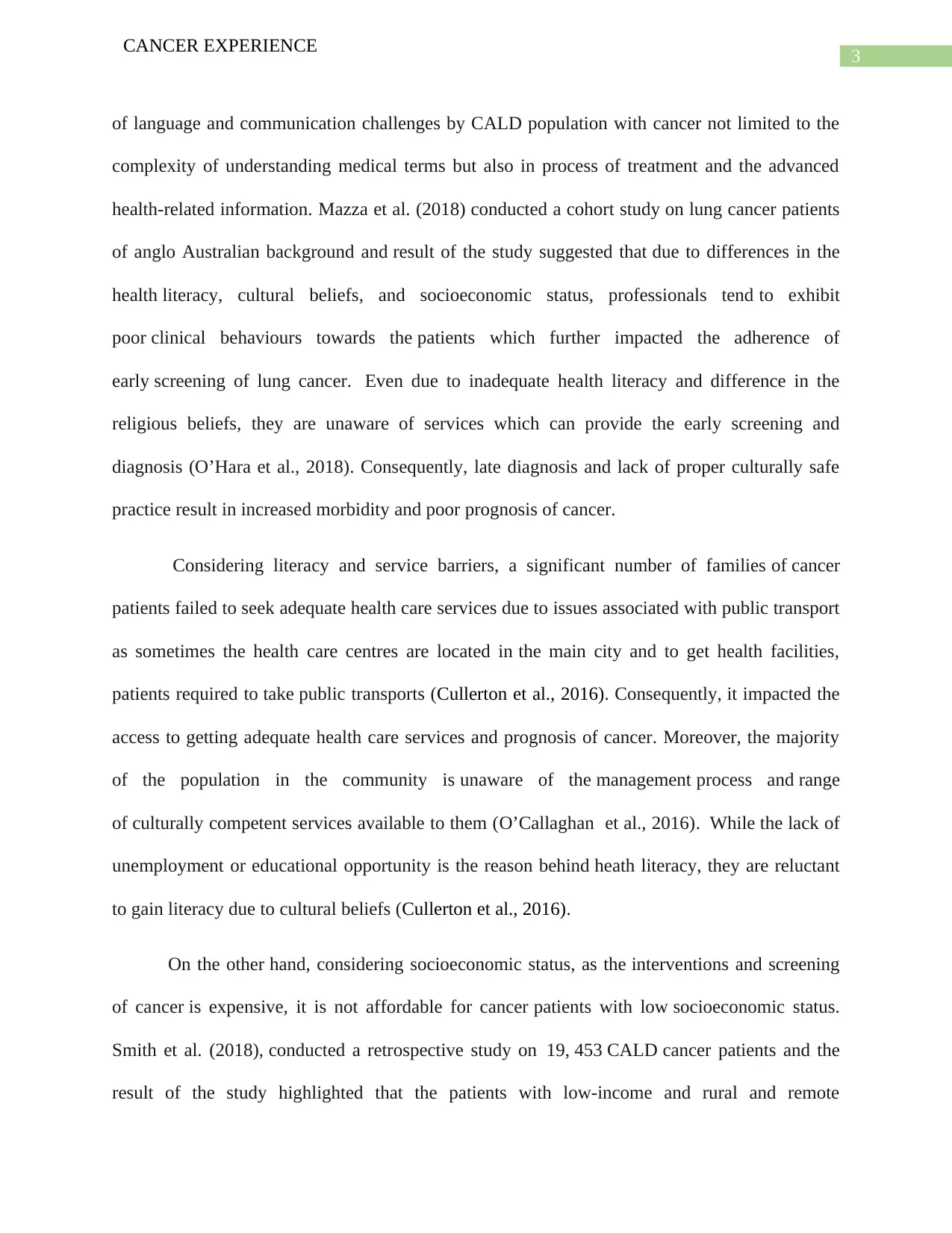
3
CANCER EXPERIENCE
of language and communication challenges by CALD population with cancer not limited to the
complexity of understanding medical terms but also in process of treatment and the advanced
health-related information. Mazza et al. (2018) conducted a cohort study on lung cancer patients
of anglo Australian background and result of the study suggested that due to differences in the
health literacy, cultural beliefs, and socioeconomic status, professionals tend to exhibit
poor clinical behaviours towards the patients which further impacted the adherence of
early screening of lung cancer. Even due to inadequate health literacy and difference in the
religious beliefs, they are unaware of services which can provide the early screening and
diagnosis (O’Hara et al., 2018). Consequently, late diagnosis and lack of proper culturally safe
practice result in increased morbidity and poor prognosis of cancer.
Considering literacy and service barriers, a significant number of families of cancer
patients failed to seek adequate health care services due to issues associated with public transport
as sometimes the health care centres are located in the main city and to get health facilities,
patients required to take public transports (Cullerton et al., 2016). Consequently, it impacted the
access to getting adequate health care services and prognosis of cancer. Moreover, the majority
of the population in the community is unaware of the management process and range
of culturally competent services available to them (O’Callaghan et al., 2016). While the lack of
unemployment or educational opportunity is the reason behind heath literacy, they are reluctant
to gain literacy due to cultural beliefs (Cullerton et al., 2016).
On the other hand, considering socioeconomic status, as the interventions and screening
of cancer is expensive, it is not affordable for cancer patients with low socioeconomic status.
Smith et al. (2018), conducted a retrospective study on 19, 453 CALD cancer patients and the
result of the study highlighted that the patients with low-income and rural and remote
CANCER EXPERIENCE
of language and communication challenges by CALD population with cancer not limited to the
complexity of understanding medical terms but also in process of treatment and the advanced
health-related information. Mazza et al. (2018) conducted a cohort study on lung cancer patients
of anglo Australian background and result of the study suggested that due to differences in the
health literacy, cultural beliefs, and socioeconomic status, professionals tend to exhibit
poor clinical behaviours towards the patients which further impacted the adherence of
early screening of lung cancer. Even due to inadequate health literacy and difference in the
religious beliefs, they are unaware of services which can provide the early screening and
diagnosis (O’Hara et al., 2018). Consequently, late diagnosis and lack of proper culturally safe
practice result in increased morbidity and poor prognosis of cancer.
Considering literacy and service barriers, a significant number of families of cancer
patients failed to seek adequate health care services due to issues associated with public transport
as sometimes the health care centres are located in the main city and to get health facilities,
patients required to take public transports (Cullerton et al., 2016). Consequently, it impacted the
access to getting adequate health care services and prognosis of cancer. Moreover, the majority
of the population in the community is unaware of the management process and range
of culturally competent services available to them (O’Callaghan et al., 2016). While the lack of
unemployment or educational opportunity is the reason behind heath literacy, they are reluctant
to gain literacy due to cultural beliefs (Cullerton et al., 2016).
On the other hand, considering socioeconomic status, as the interventions and screening
of cancer is expensive, it is not affordable for cancer patients with low socioeconomic status.
Smith et al. (2018), conducted a retrospective study on 19, 453 CALD cancer patients and the
result of the study highlighted that the patients with low-income and rural and remote
Paraphrase This Document
Need a fresh take? Get an instant paraphrase of this document with our AI Paraphraser
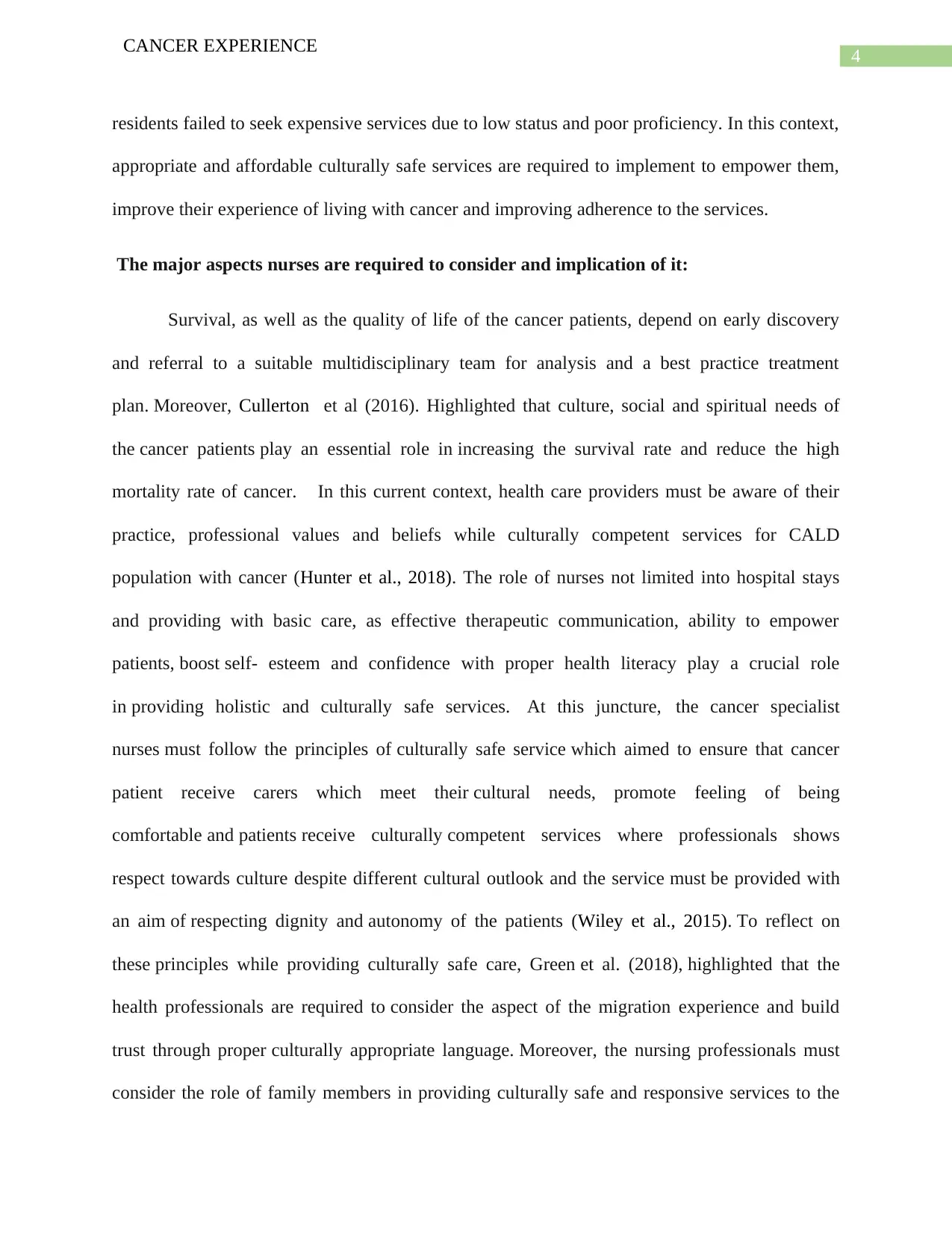
4
CANCER EXPERIENCE
residents failed to seek expensive services due to low status and poor proficiency. In this context,
appropriate and affordable culturally safe services are required to implement to empower them,
improve their experience of living with cancer and improving adherence to the services.
The major aspects nurses are required to consider and implication of it:
Survival, as well as the quality of life of the cancer patients, depend on early discovery
and referral to a suitable multidisciplinary team for analysis and a best practice treatment
plan. Moreover, Cullerton et al (2016). Highlighted that culture, social and spiritual needs of
the cancer patients play an essential role in increasing the survival rate and reduce the high
mortality rate of cancer. In this current context, health care providers must be aware of their
practice, professional values and beliefs while culturally competent services for CALD
population with cancer (Hunter et al., 2018). The role of nurses not limited into hospital stays
and providing with basic care, as effective therapeutic communication, ability to empower
patients, boost self- esteem and confidence with proper health literacy play a crucial role
in providing holistic and culturally safe services. At this juncture, the cancer specialist
nurses must follow the principles of culturally safe service which aimed to ensure that cancer
patient receive carers which meet their cultural needs, promote feeling of being
comfortable and patients receive culturally competent services where professionals shows
respect towards culture despite different cultural outlook and the service must be provided with
an aim of respecting dignity and autonomy of the patients (Wiley et al., 2015). To reflect on
these principles while providing culturally safe care, Green et al. (2018), highlighted that the
health professionals are required to consider the aspect of the migration experience and build
trust through proper culturally appropriate language. Moreover, the nursing professionals must
consider the role of family members in providing culturally safe and responsive services to the
CANCER EXPERIENCE
residents failed to seek expensive services due to low status and poor proficiency. In this context,
appropriate and affordable culturally safe services are required to implement to empower them,
improve their experience of living with cancer and improving adherence to the services.
The major aspects nurses are required to consider and implication of it:
Survival, as well as the quality of life of the cancer patients, depend on early discovery
and referral to a suitable multidisciplinary team for analysis and a best practice treatment
plan. Moreover, Cullerton et al (2016). Highlighted that culture, social and spiritual needs of
the cancer patients play an essential role in increasing the survival rate and reduce the high
mortality rate of cancer. In this current context, health care providers must be aware of their
practice, professional values and beliefs while culturally competent services for CALD
population with cancer (Hunter et al., 2018). The role of nurses not limited into hospital stays
and providing with basic care, as effective therapeutic communication, ability to empower
patients, boost self- esteem and confidence with proper health literacy play a crucial role
in providing holistic and culturally safe services. At this juncture, the cancer specialist
nurses must follow the principles of culturally safe service which aimed to ensure that cancer
patient receive carers which meet their cultural needs, promote feeling of being
comfortable and patients receive culturally competent services where professionals shows
respect towards culture despite different cultural outlook and the service must be provided with
an aim of respecting dignity and autonomy of the patients (Wiley et al., 2015). To reflect on
these principles while providing culturally safe care, Green et al. (2018), highlighted that the
health professionals are required to consider the aspect of the migration experience and build
trust through proper culturally appropriate language. Moreover, the nursing professionals must
consider the role of family members in providing culturally safe and responsive services to the
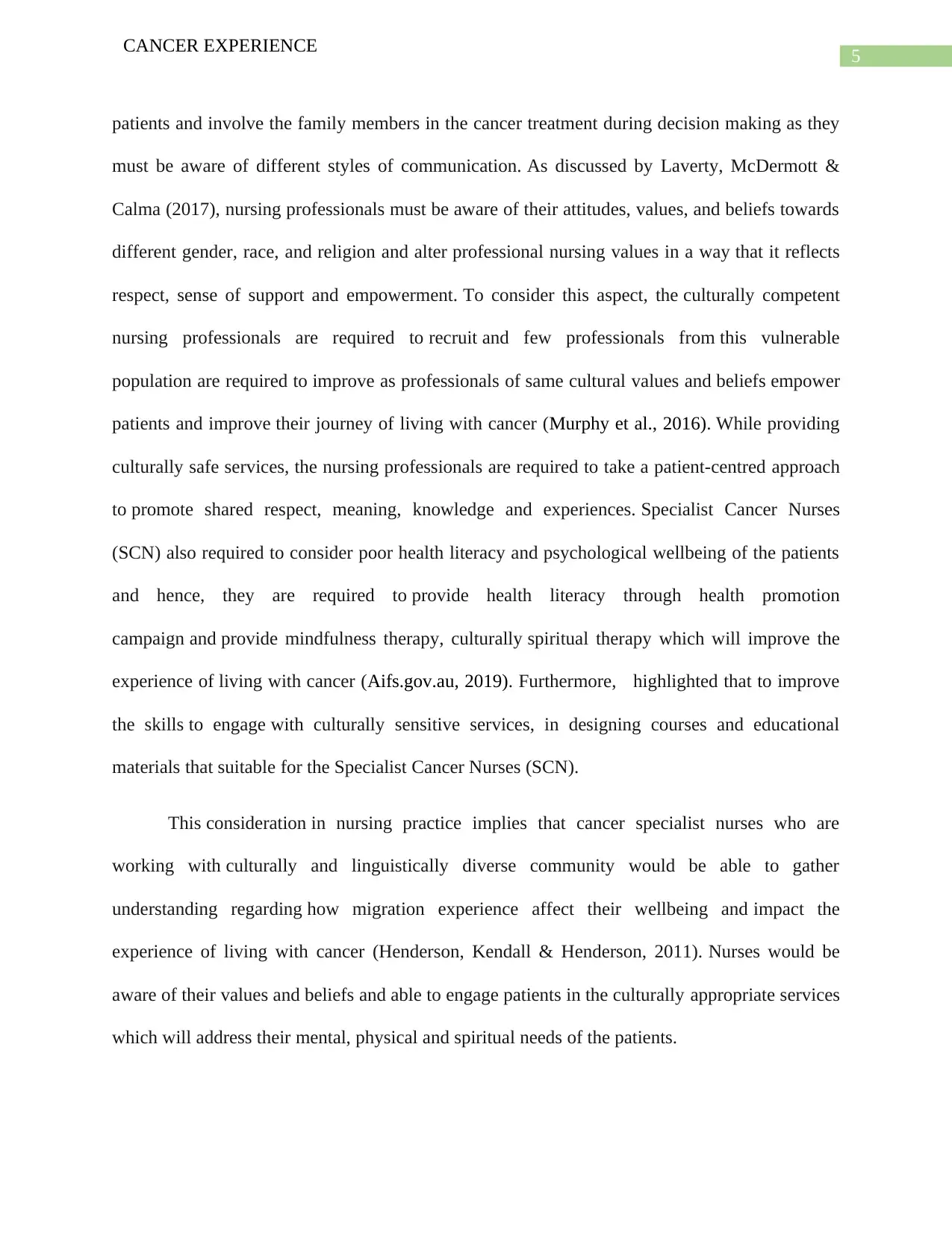
5
CANCER EXPERIENCE
patients and involve the family members in the cancer treatment during decision making as they
must be aware of different styles of communication. As discussed by Laverty, McDermott &
Calma (2017), nursing professionals must be aware of their attitudes, values, and beliefs towards
different gender, race, and religion and alter professional nursing values in a way that it reflects
respect, sense of support and empowerment. To consider this aspect, the culturally competent
nursing professionals are required to recruit and few professionals from this vulnerable
population are required to improve as professionals of same cultural values and beliefs empower
patients and improve their journey of living with cancer (Murphy et al., 2016). While providing
culturally safe services, the nursing professionals are required to take a patient-centred approach
to promote shared respect, meaning, knowledge and experiences. Specialist Cancer Nurses
(SCN) also required to consider poor health literacy and psychological wellbeing of the patients
and hence, they are required to provide health literacy through health promotion
campaign and provide mindfulness therapy, culturally spiritual therapy which will improve the
experience of living with cancer (Aifs.gov.au, 2019). Furthermore, highlighted that to improve
the skills to engage with culturally sensitive services, in designing courses and educational
materials that suitable for the Specialist Cancer Nurses (SCN).
This consideration in nursing practice implies that cancer specialist nurses who are
working with culturally and linguistically diverse community would be able to gather
understanding regarding how migration experience affect their wellbeing and impact the
experience of living with cancer (Henderson, Kendall & Henderson, 2011). Nurses would be
aware of their values and beliefs and able to engage patients in the culturally appropriate services
which will address their mental, physical and spiritual needs of the patients.
CANCER EXPERIENCE
patients and involve the family members in the cancer treatment during decision making as they
must be aware of different styles of communication. As discussed by Laverty, McDermott &
Calma (2017), nursing professionals must be aware of their attitudes, values, and beliefs towards
different gender, race, and religion and alter professional nursing values in a way that it reflects
respect, sense of support and empowerment. To consider this aspect, the culturally competent
nursing professionals are required to recruit and few professionals from this vulnerable
population are required to improve as professionals of same cultural values and beliefs empower
patients and improve their journey of living with cancer (Murphy et al., 2016). While providing
culturally safe services, the nursing professionals are required to take a patient-centred approach
to promote shared respect, meaning, knowledge and experiences. Specialist Cancer Nurses
(SCN) also required to consider poor health literacy and psychological wellbeing of the patients
and hence, they are required to provide health literacy through health promotion
campaign and provide mindfulness therapy, culturally spiritual therapy which will improve the
experience of living with cancer (Aifs.gov.au, 2019). Furthermore, highlighted that to improve
the skills to engage with culturally sensitive services, in designing courses and educational
materials that suitable for the Specialist Cancer Nurses (SCN).
This consideration in nursing practice implies that cancer specialist nurses who are
working with culturally and linguistically diverse community would be able to gather
understanding regarding how migration experience affect their wellbeing and impact the
experience of living with cancer (Henderson, Kendall & Henderson, 2011). Nurses would be
aware of their values and beliefs and able to engage patients in the culturally appropriate services
which will address their mental, physical and spiritual needs of the patients.
⊘ This is a preview!⊘
Do you want full access?
Subscribe today to unlock all pages.

Trusted by 1+ million students worldwide
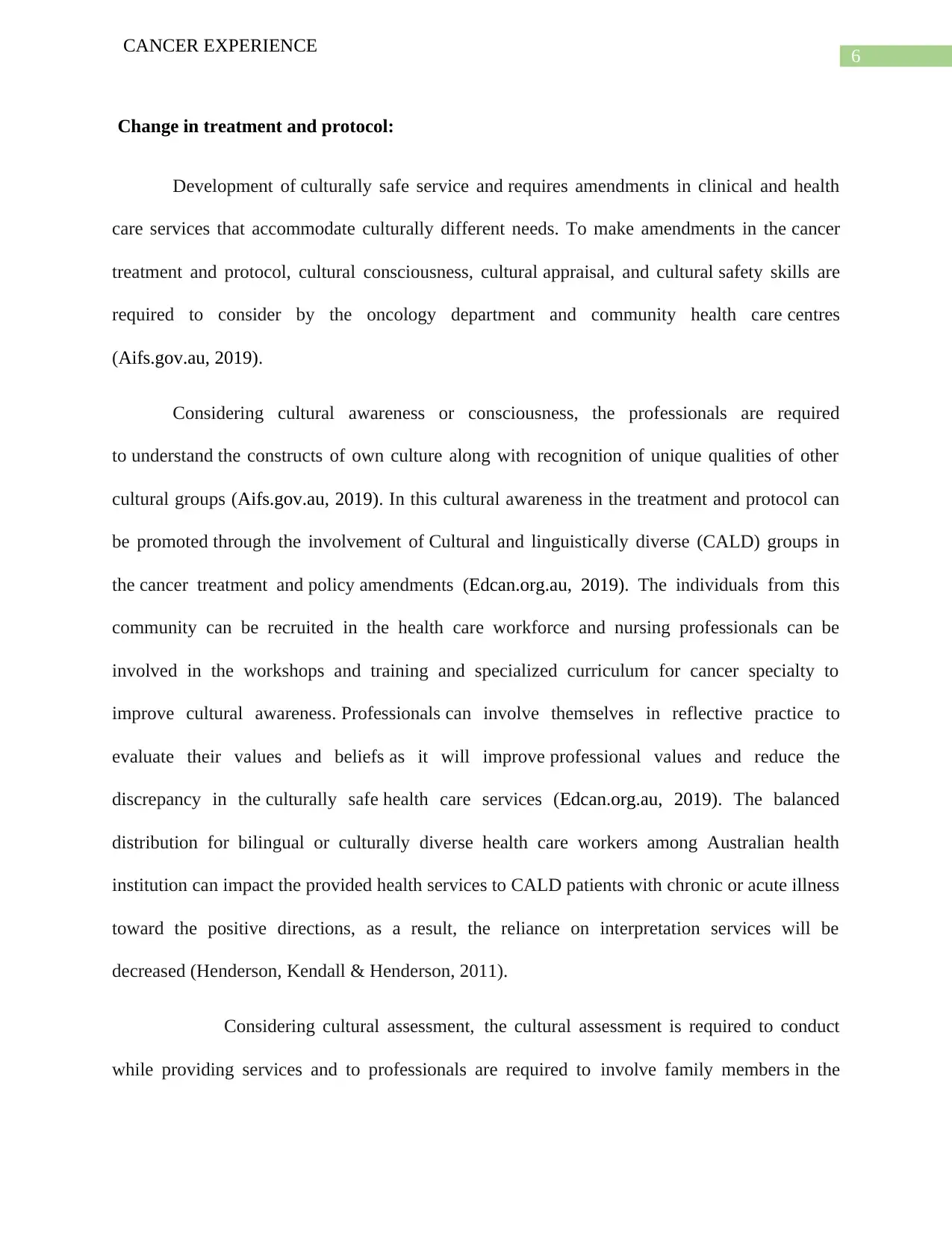
6
CANCER EXPERIENCE
Change in treatment and protocol:
Development of culturally safe service and requires amendments in clinical and health
care services that accommodate culturally different needs. To make amendments in the cancer
treatment and protocol, cultural consciousness, cultural appraisal, and cultural safety skills are
required to consider by the oncology department and community health care centres
(Aifs.gov.au, 2019).
Considering cultural awareness or consciousness, the professionals are required
to understand the constructs of own culture along with recognition of unique qualities of other
cultural groups (Aifs.gov.au, 2019). In this cultural awareness in the treatment and protocol can
be promoted through the involvement of Cultural and linguistically diverse (CALD) groups in
the cancer treatment and policy amendments (Edcan.org.au, 2019). The individuals from this
community can be recruited in the health care workforce and nursing professionals can be
involved in the workshops and training and specialized curriculum for cancer specialty to
improve cultural awareness. Professionals can involve themselves in reflective practice to
evaluate their values and beliefs as it will improve professional values and reduce the
discrepancy in the culturally safe health care services (Edcan.org.au, 2019). The balanced
distribution for bilingual or culturally diverse health care workers among Australian health
institution can impact the provided health services to CALD patients with chronic or acute illness
toward the positive directions, as a result, the reliance on interpretation services will be
decreased (Henderson, Kendall & Henderson, 2011).
Considering cultural assessment, the cultural assessment is required to conduct
while providing services and to professionals are required to involve family members in the
CANCER EXPERIENCE
Change in treatment and protocol:
Development of culturally safe service and requires amendments in clinical and health
care services that accommodate culturally different needs. To make amendments in the cancer
treatment and protocol, cultural consciousness, cultural appraisal, and cultural safety skills are
required to consider by the oncology department and community health care centres
(Aifs.gov.au, 2019).
Considering cultural awareness or consciousness, the professionals are required
to understand the constructs of own culture along with recognition of unique qualities of other
cultural groups (Aifs.gov.au, 2019). In this cultural awareness in the treatment and protocol can
be promoted through the involvement of Cultural and linguistically diverse (CALD) groups in
the cancer treatment and policy amendments (Edcan.org.au, 2019). The individuals from this
community can be recruited in the health care workforce and nursing professionals can be
involved in the workshops and training and specialized curriculum for cancer specialty to
improve cultural awareness. Professionals can involve themselves in reflective practice to
evaluate their values and beliefs as it will improve professional values and reduce the
discrepancy in the culturally safe health care services (Edcan.org.au, 2019). The balanced
distribution for bilingual or culturally diverse health care workers among Australian health
institution can impact the provided health services to CALD patients with chronic or acute illness
toward the positive directions, as a result, the reliance on interpretation services will be
decreased (Henderson, Kendall & Henderson, 2011).
Considering cultural assessment, the cultural assessment is required to conduct
while providing services and to professionals are required to involve family members in the
Paraphrase This Document
Need a fresh take? Get an instant paraphrase of this document with our AI Paraphraser
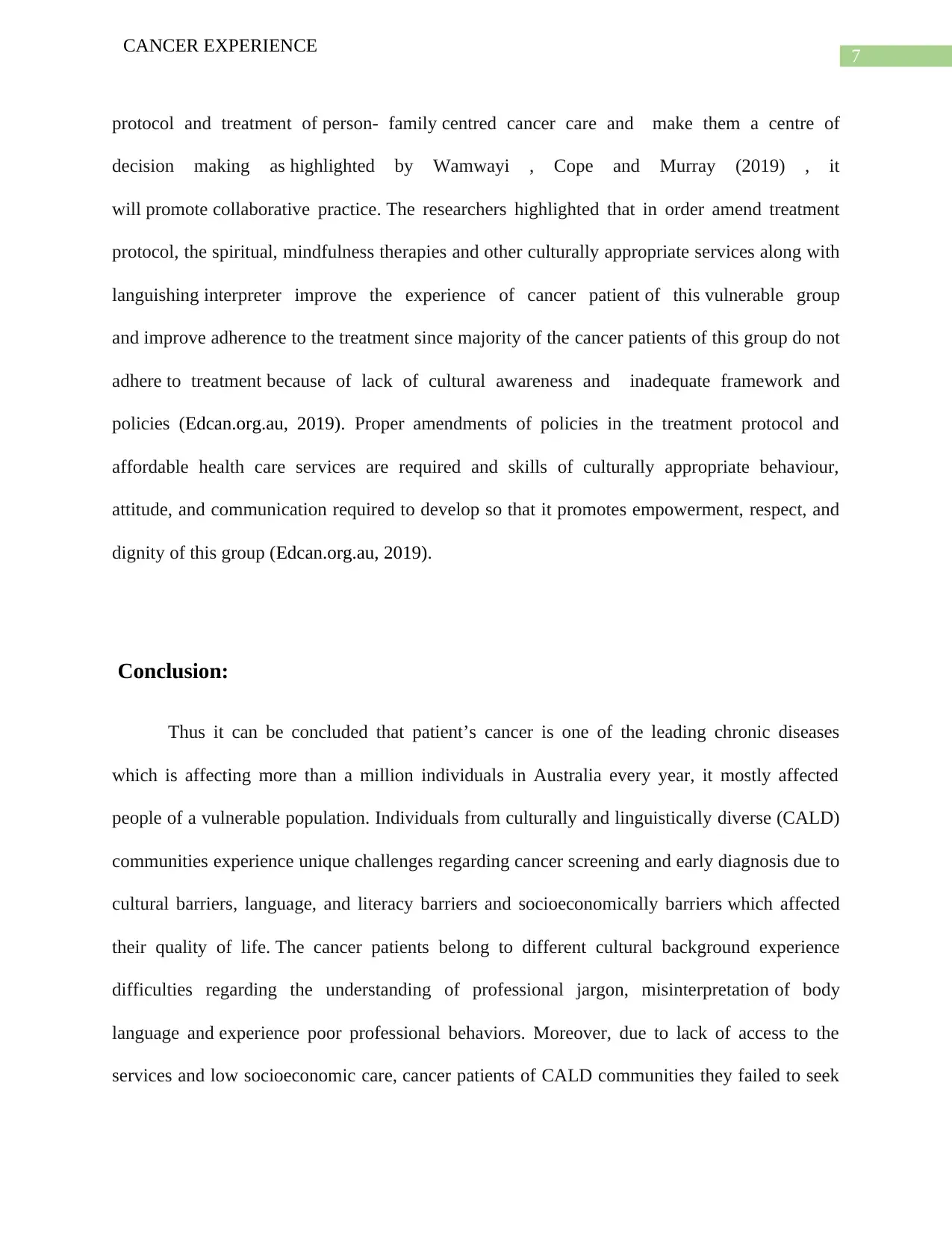
7
CANCER EXPERIENCE
protocol and treatment of person- family centred cancer care and make them a centre of
decision making as highlighted by Wamwayi , Cope and Murray (2019) , it
will promote collaborative practice. The researchers highlighted that in order amend treatment
protocol, the spiritual, mindfulness therapies and other culturally appropriate services along with
languishing interpreter improve the experience of cancer patient of this vulnerable group
and improve adherence to the treatment since majority of the cancer patients of this group do not
adhere to treatment because of lack of cultural awareness and inadequate framework and
policies (Edcan.org.au, 2019). Proper amendments of policies in the treatment protocol and
affordable health care services are required and skills of culturally appropriate behaviour,
attitude, and communication required to develop so that it promotes empowerment, respect, and
dignity of this group (Edcan.org.au, 2019).
Conclusion:
Thus it can be concluded that patient’s cancer is one of the leading chronic diseases
which is affecting more than a million individuals in Australia every year, it mostly affected
people of a vulnerable population. Individuals from culturally and linguistically diverse (CALD)
communities experience unique challenges regarding cancer screening and early diagnosis due to
cultural barriers, language, and literacy barriers and socioeconomically barriers which affected
their quality of life. The cancer patients belong to different cultural background experience
difficulties regarding the understanding of professional jargon, misinterpretation of body
language and experience poor professional behaviors. Moreover, due to lack of access to the
services and low socioeconomic care, cancer patients of CALD communities they failed to seek
CANCER EXPERIENCE
protocol and treatment of person- family centred cancer care and make them a centre of
decision making as highlighted by Wamwayi , Cope and Murray (2019) , it
will promote collaborative practice. The researchers highlighted that in order amend treatment
protocol, the spiritual, mindfulness therapies and other culturally appropriate services along with
languishing interpreter improve the experience of cancer patient of this vulnerable group
and improve adherence to the treatment since majority of the cancer patients of this group do not
adhere to treatment because of lack of cultural awareness and inadequate framework and
policies (Edcan.org.au, 2019). Proper amendments of policies in the treatment protocol and
affordable health care services are required and skills of culturally appropriate behaviour,
attitude, and communication required to develop so that it promotes empowerment, respect, and
dignity of this group (Edcan.org.au, 2019).
Conclusion:
Thus it can be concluded that patient’s cancer is one of the leading chronic diseases
which is affecting more than a million individuals in Australia every year, it mostly affected
people of a vulnerable population. Individuals from culturally and linguistically diverse (CALD)
communities experience unique challenges regarding cancer screening and early diagnosis due to
cultural barriers, language, and literacy barriers and socioeconomically barriers which affected
their quality of life. The cancer patients belong to different cultural background experience
difficulties regarding the understanding of professional jargon, misinterpretation of body
language and experience poor professional behaviors. Moreover, due to lack of access to the
services and low socioeconomic care, cancer patients of CALD communities they failed to seek
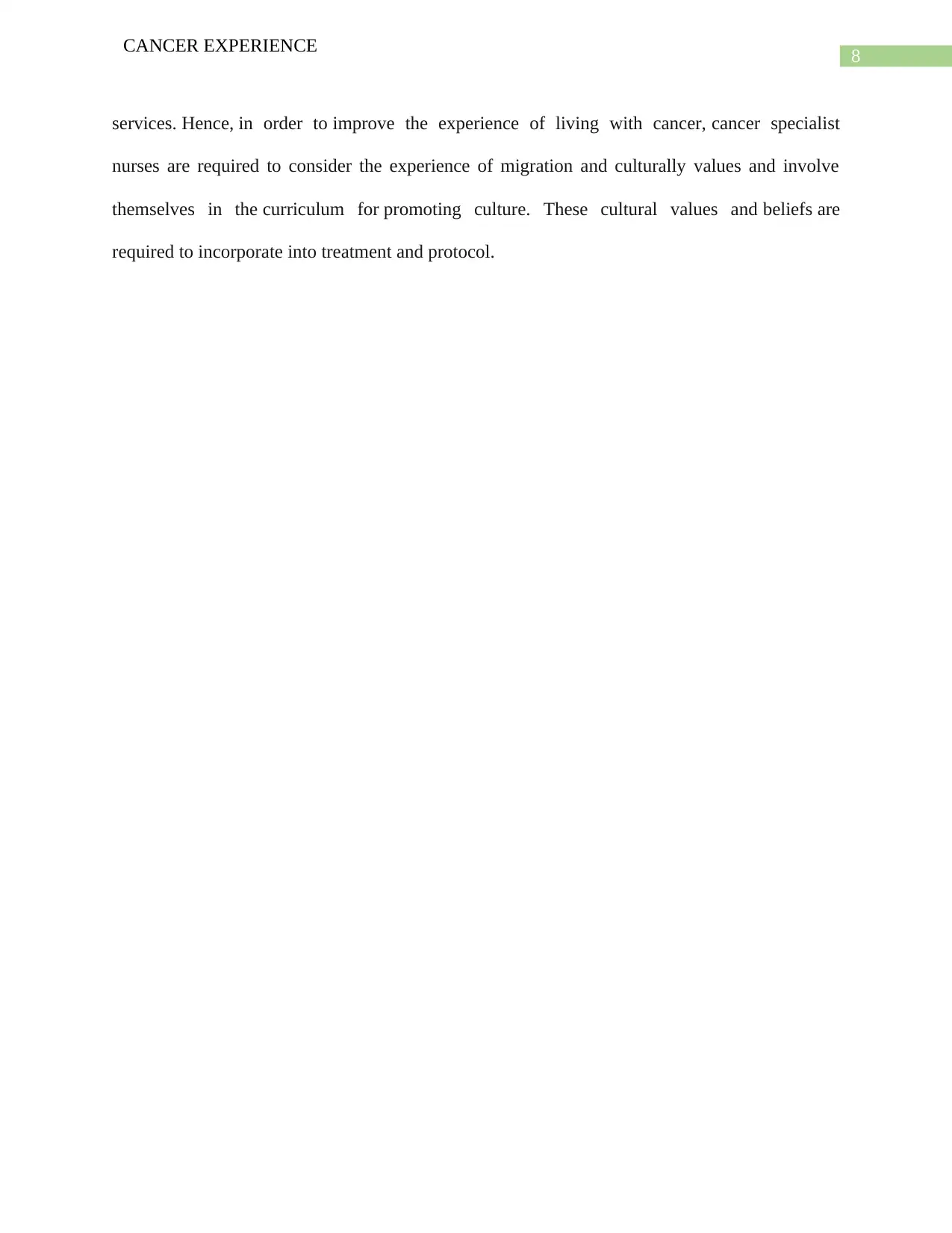
8
CANCER EXPERIENCE
services. Hence, in order to improve the experience of living with cancer, cancer specialist
nurses are required to consider the experience of migration and culturally values and involve
themselves in the curriculum for promoting culture. These cultural values and beliefs are
required to incorporate into treatment and protocol.
CANCER EXPERIENCE
services. Hence, in order to improve the experience of living with cancer, cancer specialist
nurses are required to consider the experience of migration and culturally values and involve
themselves in the curriculum for promoting culture. These cultural values and beliefs are
required to incorporate into treatment and protocol.
⊘ This is a preview!⊘
Do you want full access?
Subscribe today to unlock all pages.

Trusted by 1+ million students worldwide
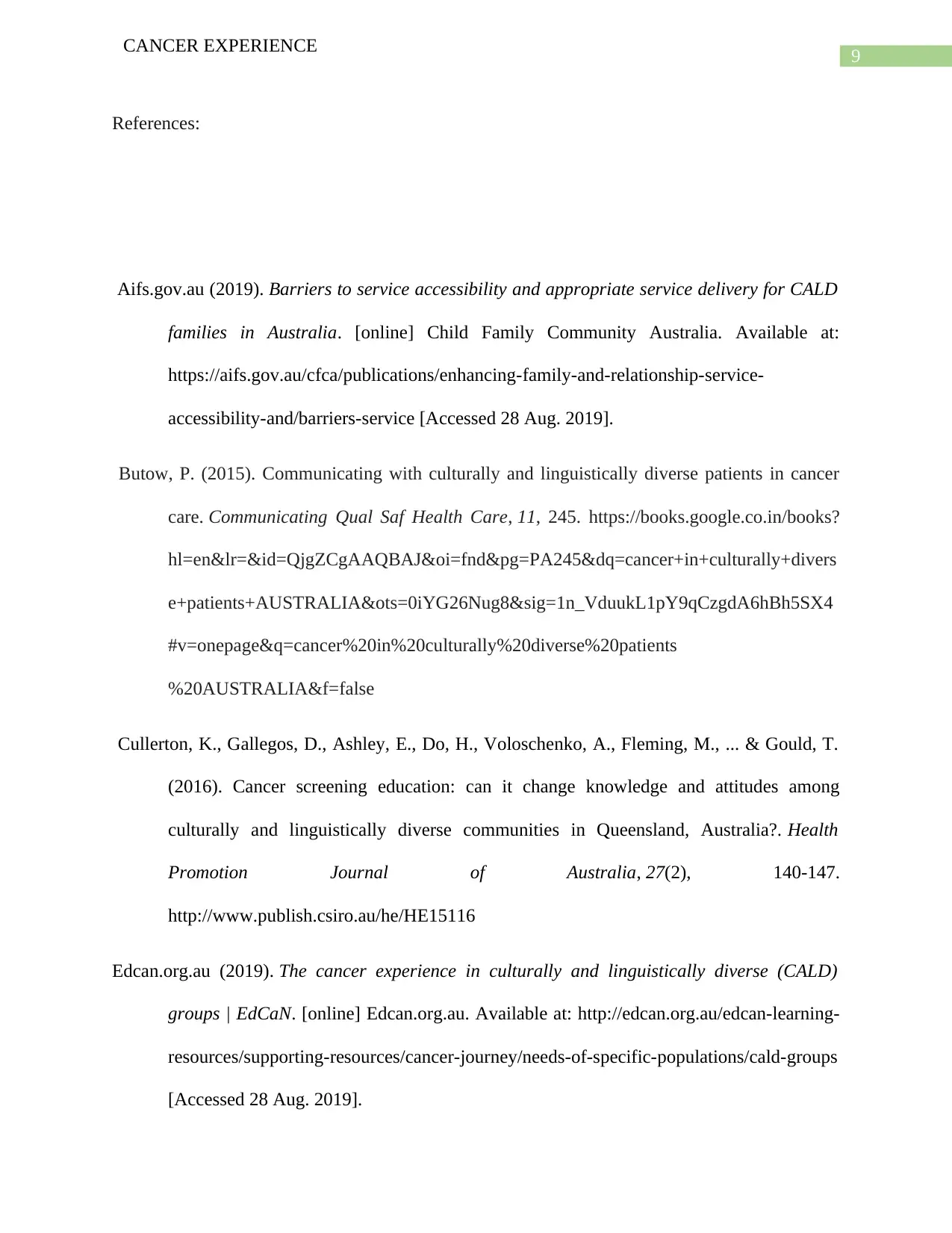
9
CANCER EXPERIENCE
References:
Aifs.gov.au (2019). Barriers to service accessibility and appropriate service delivery for CALD
families in Australia. [online] Child Family Community Australia. Available at:
https://aifs.gov.au/cfca/publications/enhancing-family-and-relationship-service-
accessibility-and/barriers-service [Accessed 28 Aug. 2019].
Butow, P. (2015). Communicating with culturally and linguistically diverse patients in cancer
care. Communicating Qual Saf Health Care, 11, 245. https://books.google.co.in/books?
hl=en&lr=&id=QjgZCgAAQBAJ&oi=fnd&pg=PA245&dq=cancer+in+culturally+divers
e+patients+AUSTRALIA&ots=0iYG26Nug8&sig=1n_VduukL1pY9qCzgdA6hBh5SX4
#v=onepage&q=cancer%20in%20culturally%20diverse%20patients
%20AUSTRALIA&f=false
Cullerton, K., Gallegos, D., Ashley, E., Do, H., Voloschenko, A., Fleming, M., ... & Gould, T.
(2016). Cancer screening education: can it change knowledge and attitudes among
culturally and linguistically diverse communities in Queensland, Australia?. Health
Promotion Journal of Australia, 27(2), 140-147.
http://www.publish.csiro.au/he/HE15116
Edcan.org.au (2019). The cancer experience in culturally and linguistically diverse (CALD)
groups | EdCaN. [online] Edcan.org.au. Available at: http://edcan.org.au/edcan-learning-
resources/supporting-resources/cancer-journey/needs-of-specific-populations/cald-groups
[Accessed 28 Aug. 2019].
CANCER EXPERIENCE
References:
Aifs.gov.au (2019). Barriers to service accessibility and appropriate service delivery for CALD
families in Australia. [online] Child Family Community Australia. Available at:
https://aifs.gov.au/cfca/publications/enhancing-family-and-relationship-service-
accessibility-and/barriers-service [Accessed 28 Aug. 2019].
Butow, P. (2015). Communicating with culturally and linguistically diverse patients in cancer
care. Communicating Qual Saf Health Care, 11, 245. https://books.google.co.in/books?
hl=en&lr=&id=QjgZCgAAQBAJ&oi=fnd&pg=PA245&dq=cancer+in+culturally+divers
e+patients+AUSTRALIA&ots=0iYG26Nug8&sig=1n_VduukL1pY9qCzgdA6hBh5SX4
#v=onepage&q=cancer%20in%20culturally%20diverse%20patients
%20AUSTRALIA&f=false
Cullerton, K., Gallegos, D., Ashley, E., Do, H., Voloschenko, A., Fleming, M., ... & Gould, T.
(2016). Cancer screening education: can it change knowledge and attitudes among
culturally and linguistically diverse communities in Queensland, Australia?. Health
Promotion Journal of Australia, 27(2), 140-147.
http://www.publish.csiro.au/he/HE15116
Edcan.org.au (2019). The cancer experience in culturally and linguistically diverse (CALD)
groups | EdCaN. [online] Edcan.org.au. Available at: http://edcan.org.au/edcan-learning-
resources/supporting-resources/cancer-journey/needs-of-specific-populations/cald-groups
[Accessed 28 Aug. 2019].
Paraphrase This Document
Need a fresh take? Get an instant paraphrase of this document with our AI Paraphraser
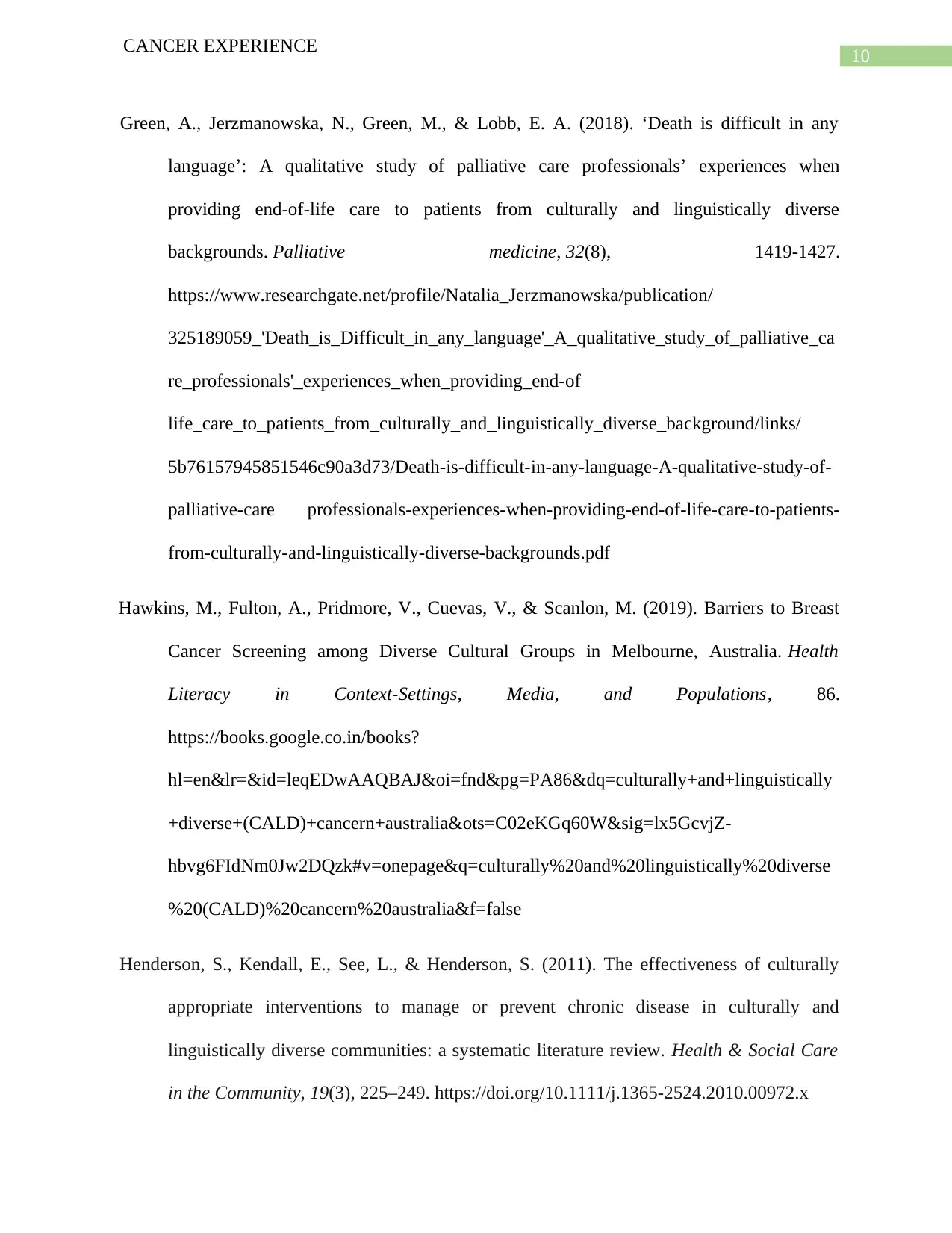
10
CANCER EXPERIENCE
Green, A., Jerzmanowska, N., Green, M., & Lobb, E. A. (2018). ‘Death is difficult in any
language’: A qualitative study of palliative care professionals’ experiences when
providing end-of-life care to patients from culturally and linguistically diverse
backgrounds. Palliative medicine, 32(8), 1419-1427.
https://www.researchgate.net/profile/Natalia_Jerzmanowska/publication/
325189059_'Death_is_Difficult_in_any_language'_A_qualitative_study_of_palliative_ca
re_professionals'_experiences_when_providing_end-of
life_care_to_patients_from_culturally_and_linguistically_diverse_background/links/
5b76157945851546c90a3d73/Death-is-difficult-in-any-language-A-qualitative-study-of-
palliative-care professionals-experiences-when-providing-end-of-life-care-to-patients-
from-culturally-and-linguistically-diverse-backgrounds.pdf
Hawkins, M., Fulton, A., Pridmore, V., Cuevas, V., & Scanlon, M. (2019). Barriers to Breast
Cancer Screening among Diverse Cultural Groups in Melbourne, Australia. Health
Literacy in Context-Settings, Media, and Populations, 86.
https://books.google.co.in/books?
hl=en&lr=&id=leqEDwAAQBAJ&oi=fnd&pg=PA86&dq=culturally+and+linguistically
+diverse+(CALD)+cancern+australia&ots=C02eKGq60W&sig=lx5GcvjZ-
hbvg6FIdNm0Jw2DQzk#v=onepage&q=culturally%20and%20linguistically%20diverse
%20(CALD)%20cancern%20australia&f=false
Henderson, S., Kendall, E., See, L., & Henderson, S. (2011). The effectiveness of culturally
appropriate interventions to manage or prevent chronic disease in culturally and
linguistically diverse communities: a systematic literature review. Health & Social Care
in the Community, 19(3), 225–249. https://doi.org/10.1111/j.1365-2524.2010.00972.x
CANCER EXPERIENCE
Green, A., Jerzmanowska, N., Green, M., & Lobb, E. A. (2018). ‘Death is difficult in any
language’: A qualitative study of palliative care professionals’ experiences when
providing end-of-life care to patients from culturally and linguistically diverse
backgrounds. Palliative medicine, 32(8), 1419-1427.
https://www.researchgate.net/profile/Natalia_Jerzmanowska/publication/
325189059_'Death_is_Difficult_in_any_language'_A_qualitative_study_of_palliative_ca
re_professionals'_experiences_when_providing_end-of
life_care_to_patients_from_culturally_and_linguistically_diverse_background/links/
5b76157945851546c90a3d73/Death-is-difficult-in-any-language-A-qualitative-study-of-
palliative-care professionals-experiences-when-providing-end-of-life-care-to-patients-
from-culturally-and-linguistically-diverse-backgrounds.pdf
Hawkins, M., Fulton, A., Pridmore, V., Cuevas, V., & Scanlon, M. (2019). Barriers to Breast
Cancer Screening among Diverse Cultural Groups in Melbourne, Australia. Health
Literacy in Context-Settings, Media, and Populations, 86.
https://books.google.co.in/books?
hl=en&lr=&id=leqEDwAAQBAJ&oi=fnd&pg=PA86&dq=culturally+and+linguistically
+diverse+(CALD)+cancern+australia&ots=C02eKGq60W&sig=lx5GcvjZ-
hbvg6FIdNm0Jw2DQzk#v=onepage&q=culturally%20and%20linguistically%20diverse
%20(CALD)%20cancern%20australia&f=false
Henderson, S., Kendall, E., See, L., & Henderson, S. (2011). The effectiveness of culturally
appropriate interventions to manage or prevent chronic disease in culturally and
linguistically diverse communities: a systematic literature review. Health & Social Care
in the Community, 19(3), 225–249. https://doi.org/10.1111/j.1365-2524.2010.00972.x
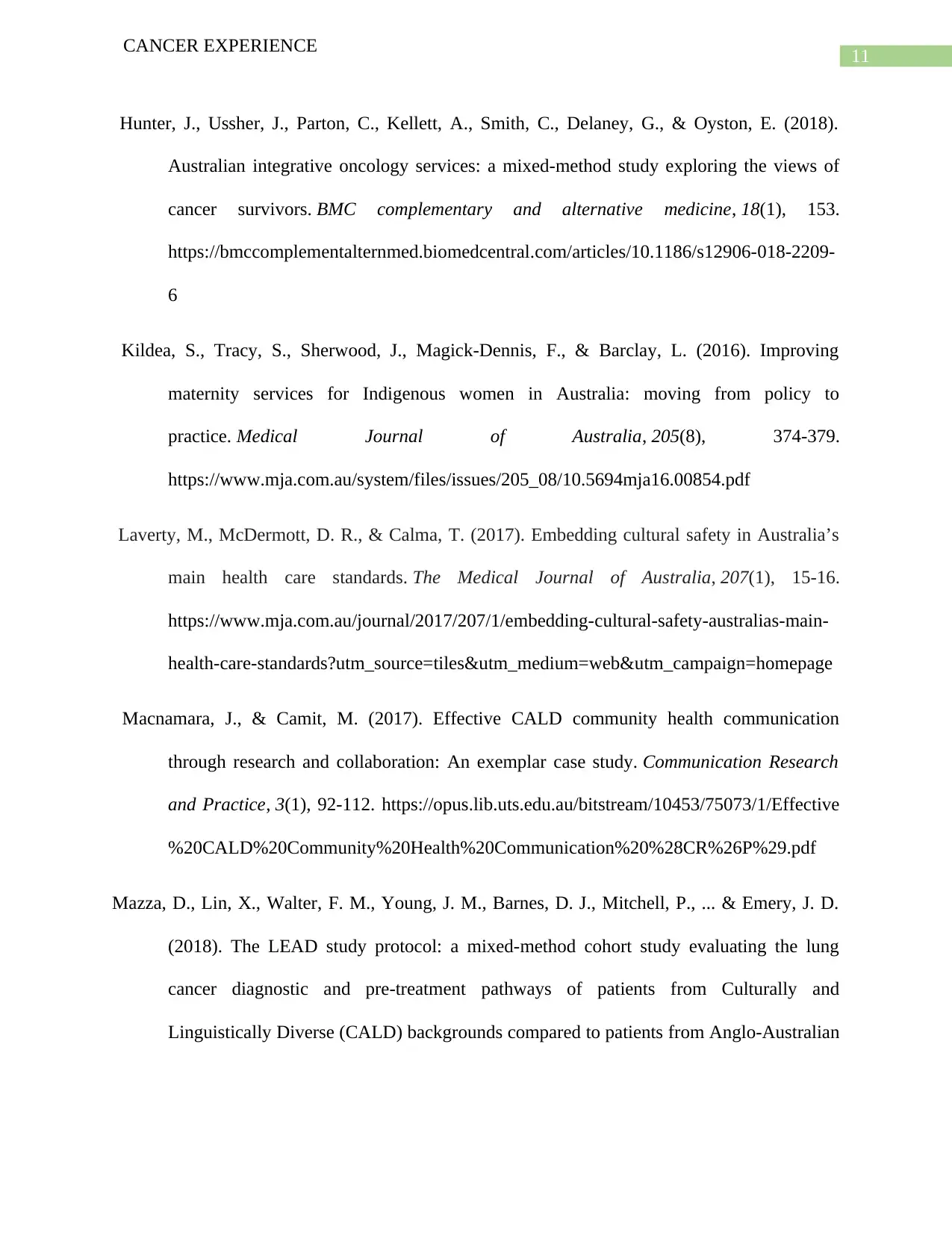
11
CANCER EXPERIENCE
Hunter, J., Ussher, J., Parton, C., Kellett, A., Smith, C., Delaney, G., & Oyston, E. (2018).
Australian integrative oncology services: a mixed-method study exploring the views of
cancer survivors. BMC complementary and alternative medicine, 18(1), 153.
https://bmccomplementalternmed.biomedcentral.com/articles/10.1186/s12906-018-2209-
6
Kildea, S., Tracy, S., Sherwood, J., Magick‐Dennis, F., & Barclay, L. (2016). Improving
maternity services for Indigenous women in Australia: moving from policy to
practice. Medical Journal of Australia, 205(8), 374-379.
https://www.mja.com.au/system/files/issues/205_08/10.5694mja16.00854.pdf
Laverty, M., McDermott, D. R., & Calma, T. (2017). Embedding cultural safety in Australia’s
main health care standards. The Medical Journal of Australia, 207(1), 15-16.
https://www.mja.com.au/journal/2017/207/1/embedding-cultural-safety-australias-main-
health-care-standards?utm_source=tiles&utm_medium=web&utm_campaign=homepage
Macnamara, J., & Camit, M. (2017). Effective CALD community health communication
through research and collaboration: An exemplar case study. Communication Research
and Practice, 3(1), 92-112. https://opus.lib.uts.edu.au/bitstream/10453/75073/1/Effective
%20CALD%20Community%20Health%20Communication%20%28CR%26P%29.pdf
Mazza, D., Lin, X., Walter, F. M., Young, J. M., Barnes, D. J., Mitchell, P., ... & Emery, J. D.
(2018). The LEAD study protocol: a mixed-method cohort study evaluating the lung
cancer diagnostic and pre-treatment pathways of patients from Culturally and
Linguistically Diverse (CALD) backgrounds compared to patients from Anglo-Australian
CANCER EXPERIENCE
Hunter, J., Ussher, J., Parton, C., Kellett, A., Smith, C., Delaney, G., & Oyston, E. (2018).
Australian integrative oncology services: a mixed-method study exploring the views of
cancer survivors. BMC complementary and alternative medicine, 18(1), 153.
https://bmccomplementalternmed.biomedcentral.com/articles/10.1186/s12906-018-2209-
6
Kildea, S., Tracy, S., Sherwood, J., Magick‐Dennis, F., & Barclay, L. (2016). Improving
maternity services for Indigenous women in Australia: moving from policy to
practice. Medical Journal of Australia, 205(8), 374-379.
https://www.mja.com.au/system/files/issues/205_08/10.5694mja16.00854.pdf
Laverty, M., McDermott, D. R., & Calma, T. (2017). Embedding cultural safety in Australia’s
main health care standards. The Medical Journal of Australia, 207(1), 15-16.
https://www.mja.com.au/journal/2017/207/1/embedding-cultural-safety-australias-main-
health-care-standards?utm_source=tiles&utm_medium=web&utm_campaign=homepage
Macnamara, J., & Camit, M. (2017). Effective CALD community health communication
through research and collaboration: An exemplar case study. Communication Research
and Practice, 3(1), 92-112. https://opus.lib.uts.edu.au/bitstream/10453/75073/1/Effective
%20CALD%20Community%20Health%20Communication%20%28CR%26P%29.pdf
Mazza, D., Lin, X., Walter, F. M., Young, J. M., Barnes, D. J., Mitchell, P., ... & Emery, J. D.
(2018). The LEAD study protocol: a mixed-method cohort study evaluating the lung
cancer diagnostic and pre-treatment pathways of patients from Culturally and
Linguistically Diverse (CALD) backgrounds compared to patients from Anglo-Australian
⊘ This is a preview!⊘
Do you want full access?
Subscribe today to unlock all pages.

Trusted by 1+ million students worldwide
1 out of 15
Related Documents
Your All-in-One AI-Powered Toolkit for Academic Success.
+13062052269
info@desklib.com
Available 24*7 on WhatsApp / Email
![[object Object]](/_next/static/media/star-bottom.7253800d.svg)
Unlock your academic potential
Copyright © 2020–2026 A2Z Services. All Rights Reserved. Developed and managed by ZUCOL.





